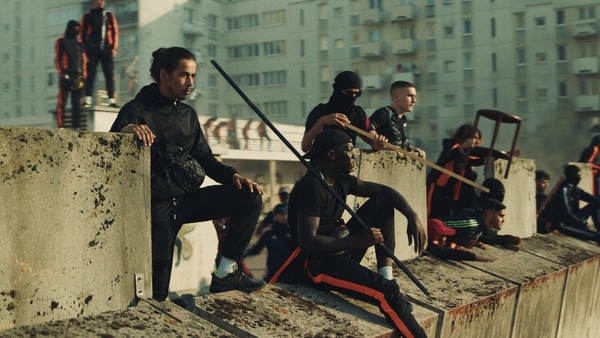Athena review: Romain Gavras' portrait of racism and police brutality is visceral, tragic, and uncompromising
Romain Gavras' film embodies the raw fury and rage of the marginalized as Paris is submerged in a social war.

Last Updated: 12.58 PM, Sep 25, 2022
Story:
Following the death of their youngest brother Ibid at the hands of a few cops, brothers Abdel and Karim find themselves thrown into deepest trenches of morality and violence in the outskirts of Paris. As Karim launches a war against the Parisian police force and becomes the face of the communal outrage, Abdel fights his own battle to stop Karim in his tracks and also deal with the tragedy of Ibid’s death.
Review:
Athena is a film about crises, of both political and psychological kinds. At the heart of chaos, characters challenge the social system in place, the ethics of power, and their own individual moralities. Athena is a film that's deeply angry and frazzled about racism and police violence but the main draw of the film is the gusto and rage with which director Romain Gavras presents it all. And he does so with such nuance or originality that you can't help but take heed to everything that's said.
And Romain Gavras (son of the legendary filmmaker Costa-Gavras) starts this expedition by dropping us, the viewers, straight into the belly of the drama. The film opens with Abdel (Dali Benssalah), a celebrated war hero, who announces that it was his kid brother Ibid who was killed recently by the police, but regardless of the abhorrence of the crime, he adds, one must help peace prevail. The fluidic camera then motions away from him and into the crowd that stands quiet and appalled in front of him, slowly revealing Karim (Sami Slimane) as he gears himself up to launch a Molotov Cocktail into the air. The weapon destabilizes everything in front of him - the stage, the people, and the peace - and just as we think that this is the height of the chaos, Gavras shows that this is just the tip of the iceberg.
In a stunning single take, we unravel how the city of Paris is falling down the abyss as anarchy envelopes the city of love without any qualms. Trailing Karim, Gavras takes us through the hallways, the streets, and the trenches of Paris that are now swamped with thousands of young men declaring a war on the police for the brutality and unfairness they have been exposed to all along. It also becomes apparent that Abdel and Karim, brothers by birth, are connected by the loss of their brother Ibid but divided on principles that a tragedy of great proportions becomes the only way out.
Romain Gavras' exploration is so immersive and visceral that one is likely to walk away from the film having the entire mayhem experienced almost first-hand. As the camera prods along and we enter the main site of the drama, the narrative splits into different perspectives and offers an overarching view of the madness. The revolutionaries, led by Karim, have launched a massive attack on the Parisian police force but aren't particularly well equipped for a stiff retaliation, threatening to impact all the various families that live in the banlieues. Abdel is trying to mediate and stop Karim from causing further damage while also trying to come to terms with the fact that his brother was brutally killed. And if that wasn’t enough, we get to see the story unfold through the eyes of multiple sources, who could belong to either side of the coin but Gavras’ film isn’t here to judge or categorize them. Instead, he says that in times of such severity, man loses all moral affiliations and tends to what is most important to him.
However, the only drawback of the manic pacing is that the emotional core comes across as a bit shallow. As the camera navigates us through the colossal mess, we are compelled to focus mostly on the literal intensity and not the emotional one because Gavras’ visual style is so overwhelming that a sense of detachment seeps in during key moments. It isn’t that his film is exploitative or pretentious and as much as his gaze (the film takes place in real-time) helps us truly realize the height of the atrocity and the communal freedom that’s at stake, it also foregoes the ability to get closer to the people caught in the dilemma.
Special shout-out to cinematographer Matias Boucard who infuses the mania into the film through his hypnotic camera work and music composer Surkin for lending it an opera-like edge.
Verdict:
The rich cinematic legacy of Greek filmmaker Costa-Gavras dictates a penchant for political unrest and it would seem that his son Romain Gavras is well equipped to keep it alive. His take on the simmering racial tensions and moral injustices is haunting, particularly as it channels these emotions through the youth. Joining the likes of Mathieu Kassovitz's La Haine and Ladj Ly's Les Misérables (Ly is also the co-writer of Athena), Athena is vivid and spectacular in every regard and the film is sure to stay with you for a long, long time with many glimpses burnt permanently on the surface of your mind.

 Premium
Premium